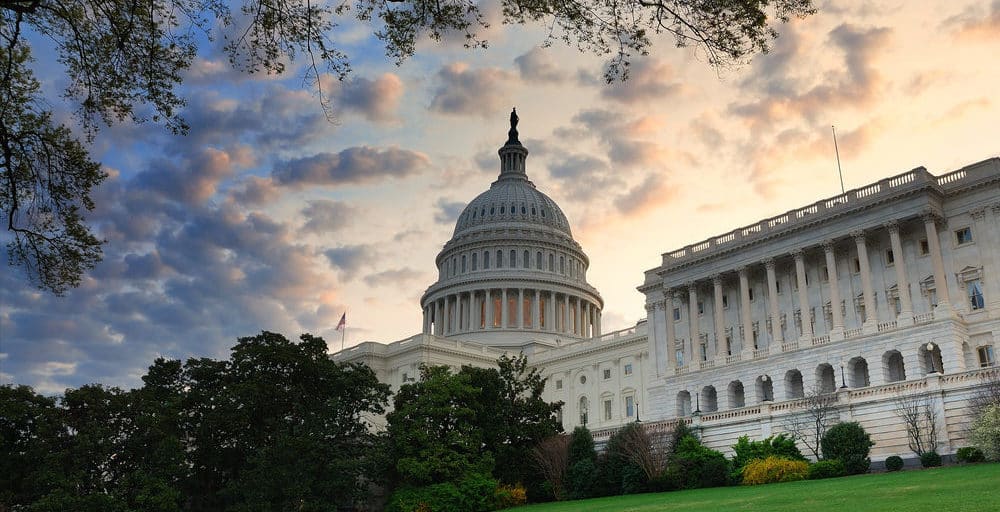07 Apr2020
By Deborah Koolbeck
As the COVID-19 pandemic led the U.S. president to declare a national emergency, education stakeholders began immediate, direct advocacy with the Congress and the Administration, and will continue as federal and congressional actions to address the COVID pandemic unfold. AACTE continues to advocate for educator preparation on Fiscal Year 2021 funding, in particular, and emergency spending packages (often referred to as supplemental measures/bills) with both legislative branches.
When AACTE staff and members talk about advocacy, we talk about the power in the combined voices of stakeholders and partners. To that end, AACTE has joined other education organizations in augmenting the voices on key issues as they emerge with the Administration and the Congress. You can access these letters via the AACTE COVID-19 Resource Hub located under AACTE Advocacy: Letters to Congress, the Administration, or other Leaders. Such letters include one that addresses the release of the Title IX regulations and rapid deployment of the funding from the third stimulus package, the CARES Act.
This section of the COVID-19 Resource Hub will be updated as AACTE signs on to letters for actions related to the COVID-19 pandemic
06 Apr2020
AACTE Responds to COVID-19
By Jane E. West
This blog post is written by AACTE consultant Jane West and is intended to provide updated information. The views expressed in this post do not necessarily reflect the views of AACTE.
Implementation of CARES Act – Third COVID Relief Package
The Administration is moving to implement the massive $2 trillion COVID response bill (known now as COVID-3) which was enacted on Friday, March 27 . For education, this means $30.75 billion for an Education Stabilization Fund that includes:
- $13.5 billion for elementary and secondary education (can be used for any activity authorized under major education laws including ESSA, IDEA, CTE and Homeless Education)
- $14.25 billion for higher education; At least 50% is for emergency financial aid to students and expense related to the pandemic
- $3 billion for governors to be used for emergency grants for the most affected local education agencies, institutions of higher education and those deemed essential to providing childcare, early childhood, K-12 or higher education services
30 Mar2020
AACTE Responds to COVID-19
By Jane E. West
This blog post is written by AACTE consultant Jane West and is intended to provide updated information. The views expressed in this post do not necessarily reflect the views of AACTE.
I am in awe of the incredible work of our colleague educators who are managing their ever-changing personal situations, while still stepping up to creatively deliver for our students. And hats off to Hill staff who have worked relentlessly and around the clock to put this third COVID-19 response package together.
Congress Will Pass Third COVID-19 Stimulus Bill with a Boost for Education
The frenzied activity on Capitol Hill has yielded the single largest funding bill in our nation’s history at $2 trillion.The 888 page bill—H.R. 748, the CARES Act—passed the Senate late Wednesday night with a vote of 96-0. (Four Senators were absent due to the virus, including Sen. Rand. Paul (R-KY) who has tested positive, and 3 others who are self-quarantining.) The House is looking to pass the bill today [Friday, March 27], hoping that a voice vote will work—meaning that no Member of the House would object. President Trump has indicated that he will sign the bill.
27 Mar2020
AACTE Responds to COVID-19
By U.S. Department of Education
 U.S. Secretary of Education Betsy DeVos announced today that the office of Federal Student Aid is executing on President Donald J. Trump’s promise to provide student loan relief to tens of millions of borrowers during the COVID-19 national emergency.
U.S. Secretary of Education Betsy DeVos announced today that the office of Federal Student Aid is executing on President Donald J. Trump’s promise to provide student loan relief to tens of millions of borrowers during the COVID-19 national emergency.
All borrowers with federally held student loans will automatically have their interest rates set to 0% for a period of at least 60 days. In addition, each of these borrowers will have the option to suspend their payments for at least two months to allow them greater flexibility during the national emergency. This will allow borrowers to temporarily stop their payments without worrying about accruing interest.
26 Mar2020
AACTE Responds to COVID-19
By Deborah Koolbeck
On March 25, 2020, the U.S. Senate passed the bipartisan third stimulus bill known as the Coronavirus Aid, Relief, and Economic Security Act, aka the CARES Act. The U.S. House of Representatives will take up the measure on March 27, sending it to the president for his signature. At this point in time, conversations are beginning on whether or not a fourth stimulus package is necessary.
Read the full CARES Act.
Read the Title-by Title Summary
The CARES Act includes the following in regard to education:
Funding
Education Stabilization Fund: This includes flexible funding that will get out the door quickly and go directly to states, local school districts, and institutions of higher education to help schools, students, teachers, and families with immediate needs related to the coronavirus, including:
23 Mar2020
AACTE Responds to COVID-19
By Deborah Koolbeck
As the United States responds to the COVID-19 pandemic, federal agencies connected to the education and care of our nation’s higher education and PK-12 students are releasing information and guidance for taking action, as well as flexibilities and waivers offered.
The U.S. Department of Education offered a phone call to K-12 stakeholder on Friday March 20, 2020, with officials from the Department, the CDC, and the U.S. Department of Agriculture. The Department has posted a readout of the call, with links to resources on servicing students with disabilities, student loan relief, student privacy, and more.
Main Links for COVID-19 Information
U.S. Department of Education
U.S. Department of Agriculture Food and Nutrition Service
Centers for Disease Control
23 Mar2020
AACTE Responds to COVID-19
By Jane E. West
This blog post is written by AACTE consultant Jane West and is intended to provide updated information. The views expressed in this post do not necessarily reflect the views of AACTE.
Washington Continues to Respond to the Coronavirus Epidemic
The Congress and federal agencies are likewise making changes by the moment. A 50,000 foot overview includes the following.
Legislative activity
- On March 6, Congress passed the first COVID-19 stimulus bill – an $8 billion package to help states and localities address the pandemic.
- On March 18, Congress passed the second COVID-19 relief package, which ensures paid sick leave to certain employees, expands SNAP and Medicaid, and provides emergency assistance.
- Congress is now considering the third COVID-19 relief package, a measure which will total between one and two trillion dollars and may address issues as far reaching as increases in unemployment insurance payments, financial assistance for hospitals and health care providers, a “state stabilization fund,” direct cash payments of $1,200 per qualified person, small business guaranteed loans, and billions in loans for industries, such as airlines. Provisions related to education are also on the menu, as described in the next article.
16 Mar2020
AACTE Responds to COVID-19
By Jane E. West

This blog post is written by AACTE consultant Jane West and is intended to provide updated information. The views expressed in this post do not necessarily reflect the views of AACTE.
Congress is working to respond to the pandemic on multiple levels. To date seven members of Congress have announced that they have been exposed to someone with COVID-19 and are self-quarantining. A staff member of Sen. Maria Cantwell (D-WA) has tested positive for the virus and Sen. Cantwell has closed her office. The U.S. Capitol has ceased public tours, both those member and staff led. The Capitol complex, including House and Senate office buildings, is restricted to official business only. Rep. Dean Phillips (D-MN) noted “We should encourage people to not travel here right now.” Washington, DC Mayor Muriel Bowser has declared the District a state of emergency and limited gatherings. Likewise, the Governors of Maryland and Virginia have declared states of emergency and limited gatherings.
13 Mar2020
AACTE Responds to COVID-19
By Lynn M. Gangone
AACTE has been closely monitoring information on the coronavirus (COVID-19) and is deeply concerned about the safety and well-being of the faculty, staff, and students within Colleges of Education. AACTE stands ready to support the educator preparation community as we all cope with this global crisis.
We have received notifications that some universities are transitioning classes to an online platform while others have canceled all classes for the remaining semester to ensure the safety of their students. We realize that this will impact clinical practice requirements and other criteria teacher candidates must complete for graduation. This is indeed a challenging time.
12 Mar2020
AACTE Responds to COVID-19
By Deborah Koolbeck
The U.S. Department of Education (Department) released guidance on March 5 and followed up with additional outreach on March 11, 2020 to ensure that institutions of higher education (IHE) are aware of options for various interrupted study due to COVID-19, including what the Department refers to as “student teaching.” This is particularly important for compliance with Title IV of the Higher Education Act. The guidance covers five scenarios including the following:
“A student was enrolled in a program and met the requirements for full-time enrollment; however, due to the COVID-19, one or more classes—such as an internship, a clinical rotation, student teaching or fieldwork—have been cancelled and now the student has fallen below the 12 credit hour minimum and is no longer considered to be a full-time student …”
Please review the guidance offered and work with your institution’s leadership, including the financial aid office moving forward. Specific situations leading to additional questions should be directed to COVID-19@ed.gov.
Other resources
U.S. Department of Education COVID-19 Resources
CDC Interim Guidance for Administrators of US Institutions of Higher Education
CDC Coronavirus 2019 (COVID-19) Fact Sheet
09 Mar2020
By Jane E. West

This blog post is written by AACTE consultant Jane West and is intended to provide updated information. The views expressed in this post do not necessarily reflect the views of AACTE.
The coronavirus outbreak has left us all a bit flummoxed this week. Higher education, school districts and all of our communities are working to provide informed leadership, but not be alarmist—a tall order when so much is unknown.
Meanwhile, Congress continues to make progress with education matters and political campaigns continue to unfold.
House and Senate Kick Off FY 2021 Appropriations Season with DeVos Hearings
In the last two weeks Sec. Betsy DeVos has appeared before both the House and Senate Subcommittees on Labor/HHS/Education to defend the Trump education budget proposal for FY 2021. The controversial budget calls for almost a $9 billion cut from last year, a block grant for virtually all elementary and secondary education programs and a familiar $5 billion voucher program (“Education Freedom Scholarships”).
06 Mar2020
By Linda Minor

Registration is now open for AACTE’s 2020 Washington Week. This annual event, with participation from AACTE and the Association of Teacher Educators (ATE) state chapter leaders, Holmes Scholars, and AACTE members and non-members alike interested in advocating for the profession, will take place in the nation’s capital. This year’s Washington Week will be held May 31 – June 3 at the Renaissance Arlington Capital View Hotel in Arlington, VA, and on Capitol Hill.
24 Feb2020
By Jane E. West
This blog post is written by AACTE consultant Jane West and is intended to provide updated information. The views expressed in this post do not necessarily reflect the views of AACTE.
Secretary DeVos to Defend President Trump’s Budget Proposal before House Labor/HHS/Education Appropriations Subcommittee Next Week
Next Thursday, February 27 at 10:00 a.m., Secretary Betsy DeVos will make her annual appearance before the House Subcommittee on Labor/HHS/Education to defend President Trump’s budget, which calls for a $5.6 billion cut in education spending. If past is prologue, we can expect feisty questions from Chair Rosa DeLauro (D-CT) and other members of the Committee — none of whom have ever warmed to a Trump education budget proposal. There is likely to be high praise for the recommended $763 million increase for Career and Technical Education in the Trump budget, but little else. Even school choice proponents are likely to balk at the recommendation to fold the $400 million federal Charter School program into a block grant. The $5 billion “Education Freedom Scholarship” proposal (aka vouchers) has never gained traction anywhere on Capitol Hill — nor amongst most voucher advocates — who don’t want the federal government and all the regulations it brings in the middle of voucher initiatives.
18 Feb2020
By Jane E. West

This blog post is written by AACTE consultant Jane West and is intended to provide updated information. The views expressed in this post do not necessarily reflect the views of AACTE.
Bad News for Education in President Trump’s FY 2021 Budget Proposal
The FY 2021 appropriations process was officially launched with the release of the President’s budget proposal on Monday. The budget is thematically similar to previous Trump budgets, in that it calls for big spending cuts all around and proposes federal support for private schools in the form of a tax credit for donations to scholarship programs (called “Education Freedom Scholarships”). The proposal represents an overall 7.8% cut ($5.6 Billion) to the Department of Education. Key features of the proposal include the following:
Elementary and Secondary Education
- Twenty-nine K-12 grant programs will be consolidated into a single block grant (“Elementary and Secondary Education for the Disadvantaged Block Grant”) designed to provide maximum flexibility for state and local systems at $19.4 Billion – a $4.7 Billion cut from current spending.
- The prized charter school grant program is consolidated into the block grant.
- The big winner in the budget proposal is Career and Technical Education which is slated for $763 million increase.
- Education Freedom Scholarships (tax credits for private schools) would cost $46 Billion over 10 years.
- All IDEA programs are level funded; however, Part B of IDEA receives a $100 million increase.
11 Feb2020
By Deborah Koolbeck
 On Monday, February 10, 2020, the President kicked off the Fiscal Year 2021 (FY21) budget process by making his budget request to the Congress. Generally released on the first Monday in February, the delay reflects the delay in completing the FY20 appropriations process, which concluded on December 20, 2019. With a divided Congress, we should expect the Administration’s highest priorities to emerge as the heads of agencies and departments testify before the subcommittees of jurisdiction on the Appropriations committees later this spring. We will then learn the priorities of the Democratic Caucus leading the U.S. House of Representatives and those of the Republican Caucus leading the U.S. Senate, as subcommittee bills are released and marked up.
On Monday, February 10, 2020, the President kicked off the Fiscal Year 2021 (FY21) budget process by making his budget request to the Congress. Generally released on the first Monday in February, the delay reflects the delay in completing the FY20 appropriations process, which concluded on December 20, 2019. With a divided Congress, we should expect the Administration’s highest priorities to emerge as the heads of agencies and departments testify before the subcommittees of jurisdiction on the Appropriations committees later this spring. We will then learn the priorities of the Democratic Caucus leading the U.S. House of Representatives and those of the Republican Caucus leading the U.S. Senate, as subcommittee bills are released and marked up.
For the U.S Department of Education (Department), the President’s Budget Request cut the agency’s funding by $6.1 billion, or 8.4% from Fiscal Year 2020 levels. The key initiatives in the President’s Budget Request include the following:
Education Freedom Scholarships
This program establishes a federal tax credit program for voluntary donations to state-designed scholarships for elementary and secondary students offered by state-identified 501c3 non-profit entities. While these scholarships have been proposed before, this FY21 request includes and expansion of the opportunities for students and families.







 U.S. Secretary of Education Betsy DeVos announced today that the office of Federal Student Aid is executing on President Donald J. Trump’s promise to provide student loan relief to tens of millions of borrowers during the COVID-19 national emergency.
U.S. Secretary of Education Betsy DeVos announced today that the office of Federal Student Aid is executing on President Donald J. Trump’s promise to provide student loan relief to tens of millions of borrowers during the COVID-19 national emergency.



 On Monday, February 10, 2020, the President kicked off the Fiscal Year 2021 (FY21) budget process by making his budget request to the Congress. Generally released on the first Monday in February, the delay reflects the delay in completing the FY20 appropriations process, which concluded on December 20, 2019. With a divided Congress, we should expect the Administration’s highest priorities to emerge as the heads of agencies and departments testify before the subcommittees of jurisdiction on the Appropriations committees later this spring. We will then learn the priorities of the Democratic Caucus leading the U.S. House of Representatives and those of the Republican Caucus leading the U.S. Senate, as subcommittee bills are released and marked up.
On Monday, February 10, 2020, the President kicked off the Fiscal Year 2021 (FY21) budget process by making his budget request to the Congress. Generally released on the first Monday in February, the delay reflects the delay in completing the FY20 appropriations process, which concluded on December 20, 2019. With a divided Congress, we should expect the Administration’s highest priorities to emerge as the heads of agencies and departments testify before the subcommittees of jurisdiction on the Appropriations committees later this spring. We will then learn the priorities of the Democratic Caucus leading the U.S. House of Representatives and those of the Republican Caucus leading the U.S. Senate, as subcommittee bills are released and marked up.